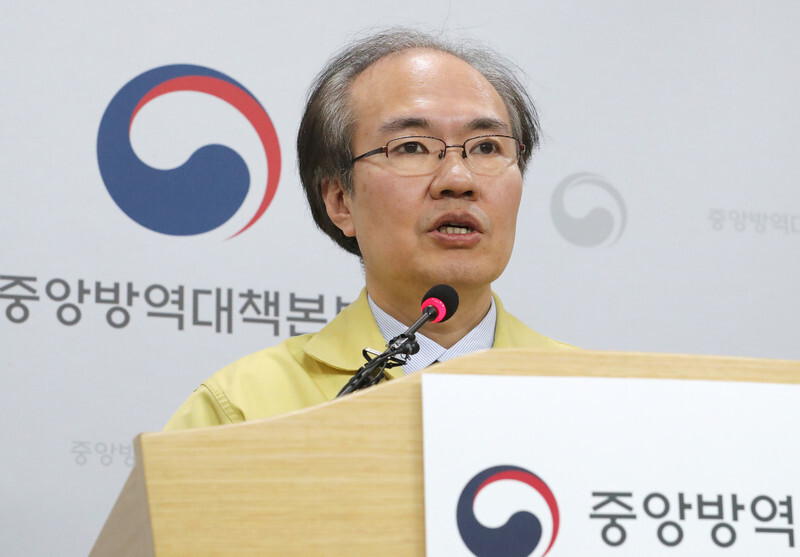hankyoreh
Links to other country sites 다른 나라 사이트 링크
Korean researchers create protein that can identify and isolate antibodies for novel coronavirus

The Korea National Institute of Health, under the Korean Centers for Disease Control and Prevention (KCDC), has successfully created a protein that can identify and isolate antibodies for the novel coronavirus from the blood. This takes us a step closer to developing a vaccine and medication for treating COVID-19, the disease caused by the virus. The public health authorities have announced that they’ll be doing their best to make the treatment available within 18 months.
“We’ve managed to develop a protein capable of detecting COVID-19 antibodies, an essential step in developing a medicine for treating the disease,” the National Institute of Health said on Mar. 10. This unique protein, known as a “probe,” can be used to detect the B cells that produce neutralizing antibodies in the blood of a COVID-19 patient in the recovery phase. Neutralizing antibodies are those that can disable or destroy the coronavirus, which is technically termed SARS-CoV-2.
“This makes it possible to produce antibodies for SARS-CoV-2. Going forward, we plan to purify various COVID-19 antigen proteins and set up a neutralization test to assess their therapeutic effectiveness,” the institute said.
The institute has already made two announcements encouraging other researchers to take part in the 12 critical tasks needed to make headway in treating COVID-19. In addition to its work with antibodies, the institute is planning to develop medication using the plasma of patients in the recovery phase.
“Promoting research in collaboration with other groups in the corporate, academic and medical sectors will move us closer to developing a COVID-19 medication that can be put to clinical use,” said Kim Seong-sun, head of the institute’s infectious disease research center.
“There are still several rounds of verification and testing that are required for developing a vaccine and medication,” said Kwon Jun-uk, director of the Korea National Institute of Health, in a briefing on Tuesday. “The WHO director-general has promised to work toward making a vaccine available within 18 months, and we’ll also be doing everything we can in line with that hope.”
By Lee Yu-jin, staff reporter
Please direct comments or questions to [english@hani.co.kr]

Editorial・opinion
![[Guest essay] Preventing Korean Peninsula from becoming front line of new cold war [Guest essay] Preventing Korean Peninsula from becoming front line of new cold war](https://flexible.img.hani.co.kr/flexible/normal/500/300/imgdb/original/2024/0507/7217150679227807.jpg) [Guest essay] Preventing Korean Peninsula from becoming front line of new cold war
[Guest essay] Preventing Korean Peninsula from becoming front line of new cold war![[Column] The state is back — but is it in business? [Column] The state is back — but is it in business?](https://flexible.img.hani.co.kr/flexible/normal/500/300/imgdb/original/2024/0506/8217149564092725.jpg) [Column] The state is back — but is it in business?
[Column] The state is back — but is it in business?- [Column] Life on our Trisolaris
- [Editorial] Penalties for airing allegations against Korea’s first lady endanger free press
- [Editorial] Yoon must halt procurement of SM-3 interceptor missiles
- [Guest essay] Maybe Korea’s rapid population decline is an opportunity, not a crisis
- [Column] Can Yoon steer diplomacy with Russia, China back on track?
- [Column] Season 2 of special prosecutor probe may be coming to Korea soon
- [Column] Park Geun-hye déjà vu in Yoon Suk-yeol
- [Editorial] New weight of N. Korea’s nuclear threats makes dialogue all the more urgent
Most viewed articles
- 1Yoon’s broken-compass diplomacy is steering Korea into serving US, Japanese interests
- 2S. Korean first lady likely to face questioning by prosecutors over Dior handbag scandal
- 3[Reporter’s notebook] In Min’s world, she’s the artist — and NewJeans is her art
- 4[Guest essay] Preventing Korean Peninsula from becoming front line of new cold war
- 5After 2 years in office, Yoon’s promises of fairness, common sense ring hollow
- 6Lee Jung-jae of “Squid Game” named on A100 list of most influential Asian Pacific leaders
- 7AI is catching up with humans at a ‘shocking’ rate
- 8Hybe-Ador dispute shines light on pervasive issues behind K-pop’s tidy facade
- 9Japan says it’s not pressuring Naver to sell Line, but Korean insiders say otherwise
- 10[Column] The state is back — but is it in business?